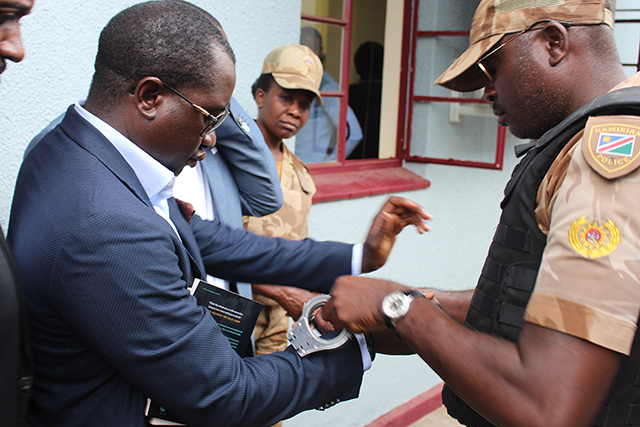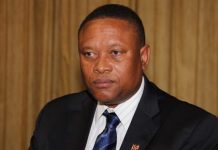By Shinovene Immanuel | 2 December 2019
FORMER justice minister Sacky Shanghala dodged questions relating to the N$4,5 million paid to his company by a fishing entity that benefited from the Angolan fishing quota donation scheme.
The payments are part of information in a documentary, ‘Anatomy of a Bribe’, by global television network Al Jazeera’s Investigative Unit, which was broadcast yesterday.
Shanghala, former fisheries minister Bernhard Esau and former Investec Namibia managing director James Hatuikulipi are the alleged kingpins in a fishing scheme which generated kickbacks of at least N$150 million over four years.
The documentary includes an interview with Shanghala, who was confronted with evidence of payments to an entity he owns.
They revolve around a Namibian company called Nangomar Pesca, which was used as a conduit to receive fishing quotas donated to the Angolan state by the Namibian government.
The same Namgomar – after getting millions of dollars from Icelandic seafood company Samherji – paid N$9,9 million to Otuafika Logistics, which is owned by James Hatuikulipi’s business partner and relative Pius ‘Taxa’ Mwatelulo.
Around N$4,5 million of that payment was paid to Olea Investments, which is owned by Shanghala.
Al Jazeera’s Investigative Unit first asked Shanghala about the payment to Olea Investments.
He initially pleaded ignorance. “No, that is not true. I don’t… I have no recollection of money coming from any relationship with Samherji,” he said.
“What about Olea Investments?” the reporter asked.
“Olea is a company I own,” Shanghala replied.
He was reminded that his company received N$4,5 million from the Angolan fishing quota deal.
The former attorney general confidently replied: “Well, I challenge you that it received the money.”
The reporter pulled out bank statements which showed the flow of the money to Shanghala’s company.
Then the former minister backtracked.
“Since I’m not a… a director of running the company, I wouldn’t know, but the auditors are there,” Shanghala responded.
Pressed further, Shanghala said: “Well look, I put… give evidence, put me before a court of law. Put me before an investigating officer, and the auditors are there, and then they answer and then we finish…”
Questioned further, he said: “Well, what I’m saying is Olea is a company run – not by me – but by Mr Hatuikulipi.”
“When I went to the Law Reform and Development Commission, I handed over all powers to run all my entities… I declared it. And I handed it over to the people,” he said.
WikiLeaks documents show that Shanghala was plotting questionable fishing schemes while he was the law reform chief in 2013.
Before going into the payment questions, Shanghala was asked about the level of corruption in Namibia.
“Thank you for asking. I have been at the forefront of reforming the fishing industry. We have all the legislation in place, and what we’ve picked up is, yes there are levels of corruption, but they’re very miniscule. It’s not really an issue we’re worried about,” he stated. The discredited minister also said: “It was actually corrupt before we came in. You had a lot of people who understood that once I have the fishing right, I can get rich quick”.
There are now allegations that the reforms he pushed through benefited him, his business partner Hatuikulipi and Esau.
In fact, Shanghala was key in crafting the Namibia-to-Angola fishing donation.
He made a presentation in Iceland on 20 August 2014.
The presentation was made a month after Esau signed the donation agreement with his counterpart in Angola.
Titled ‘Namgomar Opportunity Presentation to Mr Torsteinn’, Shanghala’s presentation maps out the scheme.
It states that benefiting from fishing quotas would not have worked unless the Namibian government came up with an agreement with Angola.
“The opportunity we have in Angola and Namibia is not available to everyone. Before everyone wakes up, we need to move and make [an] impact. This will protect both ministers,” he said.
Another slide states: “No need to re-apply (no expiry, diplomatic relevance).”
Next slide: “We need to ensure that in Angola and Namibia, even if government/minister changes, there will be no need to touch the arrangement, but to ensure that quota is issued.”
“Therefore, we need to prepare a plan for Angola, and manage the Angolan partners and their expectations.”






